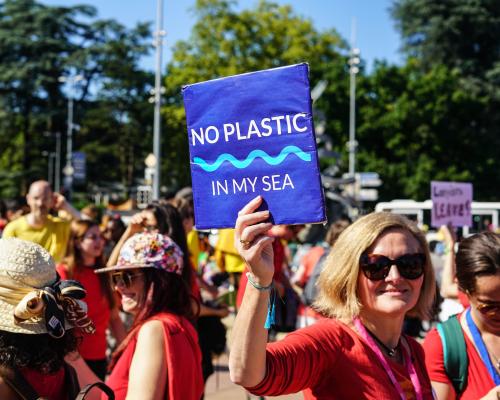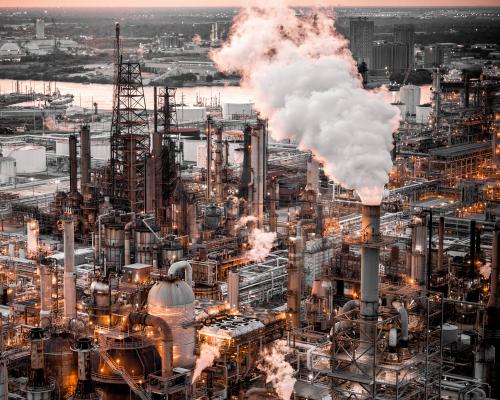
More than 200 industry lobbyists are attending the UN’s meeting to hammer out a global plastics treaty, raising fears that moves to prevent runaway plastic production may be undermined.
The 234 lobbyists from the oil, petrochemical and plastics industries outnumber the combined delegations of all 27 EU member states, and far exceed the number of people attending with the delegation of scientists as well as Indigenous peoples at the Geneva talks.
The analysis, from the Centre for International Environmental Law (Ciel), also found 19 lobbyists sit on the national delegations of Egypt, Kazakhstan, China, Iran, Chile and the Dominican Republic.
“Fossil fuel companies are central to plastic production, as over 99% of plastics are derived from chemicals sourced from fossil fuels,” said Ximena Banegas, Ciel’s global plastics and petrochemicals campaigner. “After decades of obstruction in the climate negotiations, why would anyone think that they would suddenly show up in good faith in the plastics treaty talks?”
The figure was revealed on day three of a two-week resumed meeting to achieve an agreement on the vast global problem of runaway plastic production and waste. The numbers of lobbyists attending the talks has been rising steadily since the process started in 2022, alongside deepening rifts between nations.
Negotiations stalled at what was supposed to be the fifth and final round of talks in Busan, South Korea, in December last year. The process was extended to the current round in Switzerland to give nations another chance to agree on a deal. Tensions have flared around key aspects of the proposed treaty, including calls for a production limit on plastics, managing harmful chemicals in plastics, and how the treaty’s implementation will be financed, with countries splitting into increasingly divergent camps.
On the one hand is a cohort of more than 100 nations that say they want an ambitious treaty including, among other things, global targets to reduce plastic production. On the other is a small group of oil and plastic-producing states including Russia, Saudi Arabia and Iran – the so-called “like-minded group” – that reject production limits and want the treaty to focus on downstream measures to tackle waste.
Three days into negotiations, these separate camps seem to be further entrenched, with the United States appearing to side with the industry-friendly “like-minded group”.
“They’re basically going full Maga,” said a source close to the talks. “They’re clearly coordinating with Saudi Arabia, Russia and others, because they’re using the same language.” Before the meeting in Geneva, the US reportedly circulated a memo among countries where it openly took a stance against production cuts. The US is the world’s second-largest plastic producer and yet last year said it supported production cuts.
The source also noted that the US delegation usually met environmental NGOs, scientists and industry before the talks begin, but that before the Geneva meeting they had met with industry alone.
“Even under a Democratic administration, the US is incredibly industry-friendly, but it at least goes through the motions of consulting with its own citizenry,” they said. “That charade is gone now.”
Two days before Ciel’s estimate was released, the International Council of Chemical Associations (ICCA), an industry trade body, released their own statement saying that they had 136 representatives of the plastic, petrochemical and chemical manufacturing industries present at the talks.
Referring to their headcount, an ICCA spokesperson said: “We are significantly outnumbered by the more than 1,500 NGO participants.” However, civil society groups say this is a false comparison, as lobbyists have comparatively more power at the talks. Ciel’s analysis shows several lobbyists appear on government delegations from where they can actively sculpt the treaty text. Their impact is also felt on the outside, as even the lobbyists who attend only as negotiation observers – a group that includes industry representatives, civil society organisations and scientists – have “privileged access” to delegates, for example, through industry-sponsored unofficial side events that are common in the margins of the talks.
Jo Banner, who is part of the US civil society environmental justice delegation, and lives in Louisiana’s petrochemical industry hub known as “Cancer Alley”, highlights the disconnect between the lobbying work that industry representatives will do in Geneva and the harms that this ultimately leads to on the ground.
“This is just a job for them. This is about their 401(k)s and their retirement plans. It’s life or death for us and I don’t want my obituary to be part of their resumé. We’re here fighting to protect our communities. It’s beyond being a job for us.”
Last week, Greenpeace released a report showing that seven petrochemical majors – including Dow, ExxonMobil and Shell – have collectively increased their plastic production capacity by 1.4m tonnes since the start of the treaty-making process and have sent a combined total of 70 representatives to the talks.
Another factor that may have an effect on the ongoing negotiations is the death in a helicopter accident of the Ghanaian environment minister, Dr Ibrahim Murtala Muhammed, who was due at the meeting alongside more than 70 government ministers next week. Ghana is the chair of the African Group, a 52-nation bloc that has favoured an ambitious treaty from the beginning.
If the talks go according to schedule, an agreement should be reached by 14 August.





